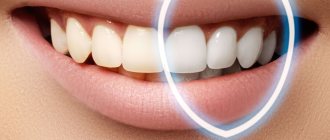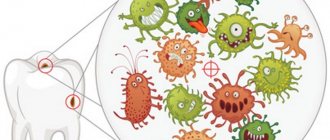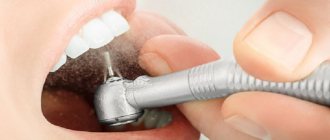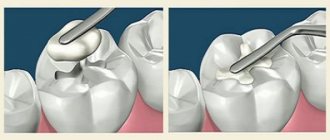It is no secret that calcium is necessary for the formation of bone and dental tissue. In this regard, a completely logical question arises: is it possible to consume additional calcium to strengthen teeth? Dentists unanimously state that during the formation of teeth (and this is during childhood), this macronutrient is extremely necessary, but in adults calcium will not be able to improve their condition. To strengthen tooth enamel, special dental procedures are recommended for adults. In St. Petersburg they are carried out by specialists from Nurimed dentistry. You can make an appointment with a doctor by calling.
Proper nutrition: calcium for dental health
Lack of calcium in the body leads to multiple health problems, and affects not only the condition of the teeth. A sufficient amount of this macroelement is responsible for the health of the endocrine and cardiovascular systems. Calcium regulates processes occurring in the nervous system and affects blood clotting. If a person does not receive enough of this substance, then the body independently solves this problem by obtaining calcium from the bones.
You can eat many foods high in calcium, but this will not help improve the health of your teeth or slow down tooth decay. However, following the rules of a healthy diet, drawing up a daily diet taking into account all vital vitamins and macroelements is important in order to maintain your body and not aggravate the situation.
Where is calcium found?
Indeed, in the human body, calcium is mainly found in bone tissue, tooth enamel and dentin - the basis of teeth. In total, 99% of it is there. And only one percent of this mineral is found in other tissues - muscles, blood, intercellular fluid. But this one percent is very important: it ensures muscle contraction, including the heart muscle, regulates the functioning of the nervous system, participates in the process of blood clotting, and helps the endocrine system. And therefore, if the body lacks it, it comes from the bones, which are a kind of storage of this element.
Usage rate
Throughout a person’s life, the required amount of calcium changes:
- Infants under 6 months need 200 mg daily.
- Children from 7 months to one year need 260 mg per day.
- Between the ages of one and three years, a child needs 700 mg.
- Children from 4 to 8 years old need 1000 mg of the macronutrient daily.
- A maximum dose of 1300 mg/day is needed for ages 9-18 years.
- Women aged 19 to 50 years need 1000 mg of calcium per day.
- Men aged 19 to 70 years need 1000 mg per day.
- Women aged 51 years and older need 1200 mg daily.
- Men 71 years of age and older require 1,200 mg of calcium per day.
The greatest amount of calcium is needed by a person in childhood and adolescence, when permanent teeth appear. This is due to the fact that the macroelement accumulates in the teeth only during their formation. And the further condition of the teeth depends on how much this supply is replenished. Unfortunately, it will not be possible to influence the health of molars by consuming calcium-containing foods.
Calcium content in foods: replenishing calcium deficiency
Macronutrient deficiency can manifest itself in different ways. Here are its main features:
- Brittleness of nails.
- Hair fragility and loss.
- Dryness and itching of the skin.
- Pain in muscles, joints.
- A tingling feeling in the muscles.
- Frequent seizures.
- Loss of energy, lethargy, chronic feeling of fatigue and drowsiness.
If you notice signs of calcium deficiency, you can compensate for the deficiency by adjusting your daily diet.
Calcium is found in milk and dairy products (yogurt, cheese). But what about people who don’t use them? You should know that this macronutrient is also present in other products.
Fish and seafood are known for their beneficial properties. The beloved sardine in oil can rightfully be considered a storehouse of calcium. 100 grams of this canned food contains 383 mg of macronutrients. There is also calcium in shrimp. There are 90 mg of calcium per 100 grams of shrimp.
Calcium is also found in products of plant origin. The record holder among them is sesame. 100 grams of seeds contain 780 mg of calcium. One serving of white beans (approximately 175 ml) contains up to 141 mg of the macronutrient; beans contain slightly more - 194 mg. 100 grams of almonds contain 263 mg of calcium. Cauliflower will replenish 95 mg of calcium in the body with one 125 g serving. Broccoli also contains this macronutrient: 47 mg of calcium per 100 grams.
Good news for those with a sweet tooth is the information that calcium is also found in chocolate. By choosing a 100 gram milk chocolate bar, you will get up to 240 mg of calcium. But here it should be remembered that sweets in themselves are not good for teeth, so you should not choose chocolate as the only source of this macronutrient.
When introducing foods rich in calcium into your diet, you should know that it is not absorbed by the body by itself. To achieve the desired effect, it is necessary that other beneficial substances and vitamins enter the body. In particular, vitamin D3 is responsible for the absorption of calcium (on average, it needs 0.636 mg per day).
Dental vitamins during pregnancy
Taking vitamins for pregnant women is a controversial issue. Doctors recommend starting to drink synthetic complexes no earlier than the second trimester.
What kind of calcium can you drink during pregnancy to promote the formation of healthy teeth in the fetus and not lose your teeth? In fact, you can take any calcium, always with vitamin D3 and K2, as well as with the other microelements listed above. The main thing to consider is the following points:
- Do not exceed dosage.
- Do not take the complex for more than 2 months in total and 2 weeks in a row.
Dentists even advise buying good vitamins even at the stage of pregnancy planning, since the formation of teeth in the fetus occurs in the first weeks. If the expectant mother has a good supply of necessary substances in her body, then the baby will not have problems with teeth.
Of course, it is better to purchase a vitamin-mineral complex as prescribed by a doctor, and not choose it based on reviews on the Internet.
Medicines and nutritional supplements with calcium to strengthen teeth
Dentists recommend eating a piece of hard cheese with tea after meals. Although calcium will not enter the tooth enamel, it will provoke salivation. The secreted saliva promotes the self-cleaning of tooth enamel. In addition, cheese neutralizes the acids contained in salivary fluid, which in turn helps preserve tooth enamel.
If you can no longer get calcium from food, what can an adult do? Are there methods that work to strengthen tooth enamel? And here the answer is comforting: such methods exist, and some of them can be used at home.
Using toothpastes with fluoride and calcium allows you to perform superficial enamel remineralization at home. The frequency of use of such pastes is prescribed by the dentist.
To achieve faster and more sustainable results over time, you can perform this procedure in a dental office. The essence of the method is to saturate the tooth enamel with minerals. Typically, calcium phosphate and fluorine are used for such purposes. The procedure helps preserve the aesthetics of a smile, and is also used in the complex treatment of tooth sensitivity and a number of other dental problems.
Lack of calcium in the body in pregnant women
Lack of calcium in pregnant women manifests itself in the form of the symptoms described above. There is no scientifically confirmed evidence that during pregnancy calcium is “washed out” and used to form the fetus from the teeth. However, in addition to the fact that the lack of a macronutrient threatens a woman’s health, it also increases the risk of caries in a child in the future. Studies have shown that children of women who received sufficient amounts of this macronutrient during pregnancy were less likely to suffer from caries.
The required daily calcium intake for pregnant women is needed not in order to preserve their teeth, but in order to provide the required supply of macronutrients to the unborn child. The same applies to the period of feeding the baby.
Knowing how important calcium is for teeth, try to adhere to a healthy lifestyle and maintain the recommended balance of vitamins, macro- and microelements in your diet for your age. To maintain your smile, see your dentist at least twice a year.
Medical Internet conferences
Relevance. Calcium is one of the main components that make up hydroxyapatite crystals, which represent the mineral basis of hard dental tissues. There are a large number of Ca drugs of different generations on the pharmacological market, however, their price categories are different. Prevention in children should be aimed at creating optimal conditions for increasing tooth resistance and enamel maturation. It follows that for the correct formation of teeth, when the processes of primary mineralization are not yet completed, endogenous prophylaxis with calcium preparations is necessary. [1].
Purpose: to choose the most effective Ca preparation for endogenous caries prevention.
Tasks:
1) study the pharmacological features, indications, contraindications of the drug “Calcium Gluconate” as a representative of monodrugs;
2) study the pharmacological features, indications, contraindications of the drug “Calcium - D3 Nycomed” as a representative of combined calcium preparations;
3) study the pharmacological features, indications, contraindications of the drug “Kalcemin” as a representative of multivitamin preparations.
4) comparative analysis of these drugs.
Materials and methods. In the process of work, the content of dental journals was studied, an analysis of domestic and foreign articles, as well as various websites and brochures was carried out.
Results and discussion. Endogenous prevention of caries is the introduction of Ca, P, F preparations, microelements and vitamins into the child’s body. Its main directions: 1) strengthening the child’s health (treatment of chronic diseases of organs and systems; 2) prescribing drugs P, Ca, F and other macro- and microelements in combination with vitamins in various specific dosages; 3) proper balanced nutrition of a child and a pregnant woman during the formation of mineralization of tooth enamel; Calcium is the most significant macronutrient required for the mineralization of enamel. The daily calcium requirement of a growing organism is 10 – 13 mg/kg. There are: 1) monopreparations that contain only Ca salts (calcium lactate, calcium glycerophosphate, calcium gluconate); 2) combined preparations containing vitamin D or C, Ca salts, and also mineral elements (boron, zinc, magnesium); 3) multivitamin preparations. Ca gluconate is produced in tablet form of 0.25 and 0.5 g. Pharmacological action: eliminates calcium deficiency, exhibits antiallergic, hemostatic, detoxification, anti-inflammatory effects. Pharmacodynamics: eliminates calcium deficiency. Ca ions take part in the propagation of nerve impulses, in the contraction of skeletal and smooth muscles, myocardium, and in blood clotting. Pharmacokinetics: after the drug has been taken, it begins to be rapidly absorbed into the gastrointestinal tract, penetrating into the blood, where it is available in ionized and bound form. It is removed by the kidneys (20%) and with the contents of the intestines (80%). Indications: 1) hypocalcemia; 2) hypoparathyroidism; 3) rickets; 4) increased need for Ca ions (pregnancy, breastfeeding, increased body growth); 5) a small amount of Ca ions in food, lack of its metabolism; 6) intoxication with Mg salts, hydrofluoric and oxalic acids. Contraindications: 1) hypersensitivity to the components of the drug. Children under 1 year are given 0.5 g, 2 – 4 years – 1 year, 5 – 6 years – 1.5 g, 7 – 9 years – 1.5 – 2 years, 10 – 14 years – 3 – 4 g/day. Course – 1 month [2]. Anti-carious effect – remineralizing role to prevent caries and non-carious lesions. Clinically, a child’s reduced calcium intake may not be reflected in anything for a long time. But with a lack of calcium to normalize its content in the blood and create metabolic processes in the body, it begins to be washed out of the bones and teeth. Ultimately, this causes a decrease in the rate of formation of the skeletal system, improper formation of hydroxyapatites, and in acute periods of life (first year, 1-2 years, 6-7 years, 12-14 years) leads to the formation of osteopenic syndrome [3,4] . The child's compensatory capabilities to compensate for calcium deficiency are small. This is confirmed by the results of studies conducted by I.V. Kovach and co-authors, who discovered a special correlation between the mineral density of bone tissue and the intensity of the carious process in children 3-6 years of age, i.e. the lower the mineral density of bone tissue, the higher the intensity of dental caries [5]. Many scientists say that there is a close connection between somatic pathology and calcium metabolism disorders. The main ones are diseases of the kidneys (chronic renal failure, idiopathic hypercalciuria) and gastrointestinal tract (malabsorption syndrome in various diseases, duodenal ulcer), endocrine organs (diabetes mellitus). Inflammatory diseases also have a great influence on calcium metabolism. pain (osteomyelitis ), various toxic substances, radionuclides [6,7]. Of the examined children aged 5-16 years, epidemiological experiments by Russian scientists revealed the presence of osteopenia or osteoporosis in 10-30% (depending on age) [8]. They are manifested by a number of symptoms: general weakness, increased fatigue, decreased academic performance, developing dental diseases (caries, periodontitis), paresthesia and muscle twitching, dry skin, brittle nails and hair, changes in posture [9,10]. Thus, any conditions that involve a low intake of Ca or an increased consumption of Ca lead to the formation of hydroxyapatite crystals of irregular structure and properties in the hard tissues of teeth, which will have a detrimental effect on their resistance to caries. Therefore, there is an obvious need for medicinal endogenous prevention of caries in permanent teeth in children, especially during periods of rapid growth, using new calcium preparations in combination with vitamins and microelements that support its absorption in the development of mineralization of hard tissues. Particularly cheap among them are simple 1st generation calcium preparations (gluconate, lactate, glycerophosphate, citrate), which contain only calcium compounds. Still, synchronous intake of vitamin D is necessary, which was taken into account when creating calcium preparations of the 2nd generation (Calcium-D3 Nycomed, Vitrum Calcium (Unifarm, Inc., USA), Calcevid (Beres)). The bioavailability of calcium increased due to this combination, which affected the increase in the effectiveness of preventive measures [11-14]. "Calcium - D3 Nycomed" is a drug that regulates the metabolism of calcium and phosphorus. The components are calcium carbonate (500 mg) and vitamin D3 (200 IU). The auxiliary part includes: sorbitol, various flavoring additives, povidone, magnesium stearate and aspartame. It is produced in the form of chewable tablets with mint or orange flavor. Pharmacological action: improves the metabolism of calcium and phosphorus in the body and compensates for the deficiency of the main structural element. The biochemical role of calcium lies in the physiological construction of bone tissue, mineralization of teeth, the processes of coagulation and transmission of nerve impulses, and the implementation of muscle contractions. Pharmacodynamics: reduces resorption and increases bone density, replenishing calcium and vitamin D3 in the body, necessary for the mineralization of teeth. It is produced in the form of chewable tablets with mint or orange flavor. Pharmacokinetics: 1) Ca (absorption – 30% of the dose taken; distribution and metabolism – 99% Ca is concentrated in the rigid structure of bones and teeth, 1% is found in intracellular and extracellular fluids, 50% of the total Ca content in the blood appears physiologically active ionized form, of which approximately 10% is composed of phosphates and other anions, the remaining 40% is associated with proteins, primarily albumin; excretion - Ca is excreted through the intestines, kidneys and sweat glands. 2) Vitamin D3 (absorption - about 80% of the dose taken in the small intestine; distribution and metabolism - circulates in the blood in a bound state with a special globulin, metabolized in the liver, then accumulates in adipose and muscle tissue; removed through the intestines and kidneys. Indications: 1) prevention and treatment of calcium deficiency and vitamin D3; 2) prevention and complex therapy of osteoporosis and its complications. Contraindications: 1) hypercalcemia; 2) hypercalciuria; 3) hypervitaminosis D3; 4) severe renal failure; 5) hypersensitivity to the drug. Directions for use and dosage: adults and children over 12 years old - 1 tablet 2 - 3 times a day, children from 5 to 12 years old - 1 - 2 tablets per day, children from 3 to 5 - as recommended by a doctor. Anti-carious effect - for the prevention and treatment of carious and non-carious lesions, periodontal diseases, well suited for people with normal bone mineral density. Calcium-D3 Nycomed prevents a decrease in the number of chalk spots and an increase in enamel remineralization, activation of bone tissue remodeling processes and inhibition of its resorption [15-19]. Nowadays, the most effective are calcium preparations of the 3rd generation, which contain, in addition to calcium and vitamin D compounds, a number of vitamins and microelements that affect mineral metabolism (Kaltsinova (KRKA), Kalcemin (Sagmel), Biocalcevit). “Calcemin”, each tablet contains 842 mg of calcium citrate and 202 mg of calcium carbonate (250 mg of elemental calcium), 50 IU of vitamin D, 2 mg of zinc, 0.5 mg of manganese, 50 mcg of boron. The citrate and carbonate present in Kalcemin belong to the group of salts with a high content of simple Ca. At the same time, calcium citrate reduces the risk of stone accumulation in the urinary tract, hence it reduces the activity of parathyroid hormone and is absorbed by itself. Pharmacological action: replenishes calcium deficiency, regulates calcium-phosphorus metabolism, replenishes the deficiency of vitamin D, macro- and microelements. Pharmacodynamics: combination drug. Increases the resistance of hard dental tissues, prevents diseases of the musculoskeletal system. There are no data on pharmacokinetics. Indications: 1) prevention and treatment of osteoporosis; 2) replenishment of the deficiency of Ca and microelements in children, pregnant women and during breastfeeding. Contraindications: 1) urolithiasis; 2) hypercalcemia; 3) hypercalciuria; 4) hypersensitivity to the components of the drug. The anticarious effect is due to its ability to increase the resistance of tooth enamel, as well as its effect on mineral metabolism and on the body as a whole. There is no data on the effectiveness of using Calcemin for the prevention and treatment of lesions of hard dental tissues in pregnant women and children under 6 years of age in scientific literature. At the same time, it should be noted that the combination of microelements in one Calcemin tablet is not entirely justified. Magnesium and calcium have a common transport system in the intestines, so they are absorbed 2 times less. The use of the mineral-vitamin complex “Kalcemina” has a beneficial effect on the acid-base balance of the oral cavity, normalizes the processes of de- and remineralization in the enamel-saliva system, thereby reducing the intensity of caries development in adolescents [20-25].
Conclusions:
1) A special feature of the drug “Calcium Gluconate” is its low cost and the possibility of use in children under 1 year of age. The disadvantage was an overdose, with the development of hypercalcemia with deposition of Ca salts
2) A special feature of the drug “Calcium – D3 Nycomed” is the rapid absorption of the drug in the oral cavity and its pleasant taste. The downside was the presence of aspartame, which is not recommended for pregnant women.
3) A special feature of the drug “Kalcemin” was the content of vitamins and minerals necessary for humans, intended for use during pregnancy. Disadvantage: possible development of an allergic reaction.
4) The largest number of positive criteria is noted for the drug “Kalcemin”: it contains a complex of vitamins and minerals, a minimum of side effects, and contraindications. The most effective drug for endogenous prevention is Kalcemin.









